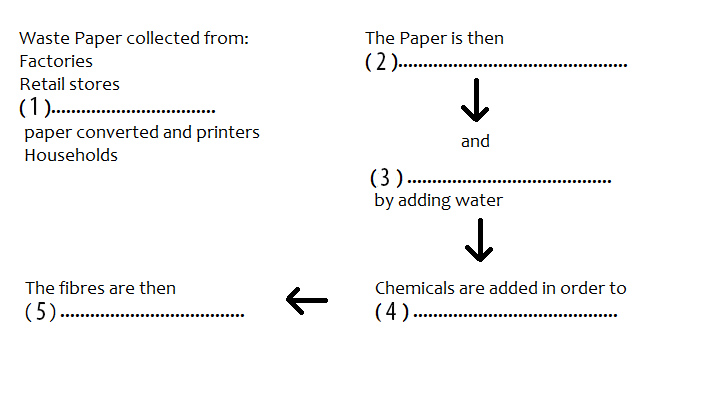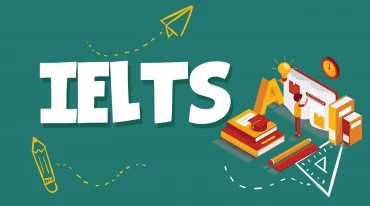
- 357 Lê Hồng Phong, P.2, Q.10, TP.HCM
- Hotline 1: 1900 7060
Hotline 2: (028) 3622 8849
Bài tập IELTS Reading: Paper Recycling - Phân tích từ vựng
Paper Recycling
A Paper is different from other waste products because it comes from a sustainable resource: trees. Unlike the minerals and oil used to make plastics and metals, trees are replaceable. Paper is also biodegradable, so it does not pose as much threat to the environment when it is discarded. While 45 out of every 100 tonnes of wood fibre used to make paper in Australia comes from waste paper, the rest comes directly from virgin fibre from forests and plantations. By world standards, this is a good performance since the worldwide average is 33 percent waste paper. Governments have encouraged waste paper collection and sorting schemes and at the same time, the paper industry has responded by developing new recycling technologies that have paved the way for even greater utilization of used fibre. As a result, industry’s use of recycled fibres is expected to increase at twice the rate of virgin fibre over the coming years.
B Already, waste paper constitutes 70% of paper used for packaging and advances in the technology required to remove ink from the paper have allowed a higher recycled content in newsprint and writing paper. To achieve the benefits of recycling, the community must also contribute. We need to accept a change in the quality of paper products; for example, stationery may be less white and of a rougher texture. There also needs to be support from the community for waste paper collection programs. Not only do we need to make the paper available to collectors but it also needs to be separated into different types and sorted from contaminants such as staples, paperclips, string and other miscellaneous items.
C There are technical limitations to the amount of paper which can be recycled and some paper products cannot be collected for re-use. These include paper in the form of books and permanent records, photographic paper and paper which is badly contaminated. The four most common sources of paper for recycling are factories and retail stores which gather large amounts of packaging material in which goods are delivered, also offices which have unwanted business documents and computer output, paper converters and printers and lastly households which discard newspapers and packaging material. The paper manufacturer pays a price for the paper and may also incur the collection cost.
D Once collected, the paper has to be sorted by hand by people trained to recognise various types of paper. This is necessary because some types of paper can only be made from particular kinds of recycled fibre. The sorted paper then has to be repulsed or mixed with water and broken down into its individual fibres. This mixture is called stock and may contain a wide variety of contaminating materials, particularly if it is made from mixed waste paper which has had little sorting. Various machineries are used to remove other materials from the stock. After passing through the repulping process, the fibres from printed waste paper are grey in colour because the printing ink has soaked into the individual fibres. This recycled material can only be used in products where the grey colour does not matter, such as cardboard boxes but if the grey colour is not acceptable, the fibres must be de-inked. This involves adding chemicals such as caustic soda or other alkalis, soaps and detergents, water-hardening agents such as calcium chloride, frothing agents and bleaching agents. Before the recycled fibres can be made into paper they must be refined or treated in such a way that they bond together.
E Most paper products must contain some virgin fibre as well as recycled fibres and unlike glass, paper cannot be recycled indefinitely. Most paper is down-cycled which means that a product made from recycled paper is of an inferior quality to the original paper. Recycling paper is beneficial in that it saves some of the energy, labour and capital that go into producing virgin pulp. However, recycling requires the use of fossil fuel, a non-renewable energy source, to collect the waste paper from the community and to process it to produce new paper. And the recycling process still creates emissions which require treatment before they can be disposed of safely. Nevertheless, paper recycling is an important economical and environmental practice but one which must be carried out in a rational and viable manner for it to be useful to both industry and the community.
Exercise: Look at paragraphs C, D, and E and, using the information in the passage, complete the flowchart below. Write your answers in boxes 1-5 on your answer sheet. Use ONE OR TWO WORDS for each answer.

ANSWER KEY
1. offices
2. sorted
3. (re)pulped
4. de-ink/remove ink/make white
5. refined
TỪ VỰNG TRONG BÀI
Biodegradable /ˌbaɪ.oʊ.dɪˈɡreɪ.də.bəl/ (adj): phân hủy sinh học (able to decay naturally and in a way that is not harmful)
Pose /poʊz/ (v): gây ra (to cause something, especially a problem or difficulty)
Miscellaneous items: những thứ linh tinh
Incur /ɪnˈkɝː/ (v): gánh chịu (to experience something, usually something unpleasant, as a result of actions you have taken)
Repulse /rɪˈpʌls/ (v): đẩy lùi (to push away or refuse something or someone unwanted, especially to successfully stop a physical attack against you)
Alkali /ˈæl.kəl.aɪ/ (n): chất kiềm (a substance that has the opposite effect or chemical behaviour to an acid)
Frothing agents: chất tạo bọt (a reagent used to control the size and stability of the air bubbles in the flotation process)
Bleaching agents: chất tẩy trắng (a material that lightens or whitens a substrate through chemical reaction)
THƯ VIỆN LIÊN QUAN

Reading là một trong bốn phần thi bắt buộc của bài thi IELTS, đây cũng được xem là phần thi thử thách nhất để chinh phục được band điểm cao. Hãy...

Bài viết cung cấp cho đọc giả Bài tập Reading part 3 - Chủ đề: Why fairy tales are really scary tales - Có đáp án

Bài viết cung cấp cho đọc giả Bài tập Reading part 2 - Chủ đề: The Desolenator: producing clean water - Có đáp án

Bài viết cung cấp cho đọc giả Bài tập Reading part 1 - Chủ đề: Henry Moore (1898-1986) - Có đáp án
Hoặc gọi ngay cho chúng tôi:
1900 7060
 | Chính sách bảo mật thông tin | Hình thức thanh toán | Quy định chung
| Chính sách bảo mật thông tin | Hình thức thanh toán | Quy định chung
Giấy chứng nhận đăng ký doanh nghiệp số 0310635296 do Sở Kế hoạch và Đầu tư TPHCM cấp.
Giấy Phép hoạt động trung tâm ngoại ngữ số 3068/QĐ-GDĐT-TC do Sở Giáo Dục và Đào Tạo TPHCM cấp